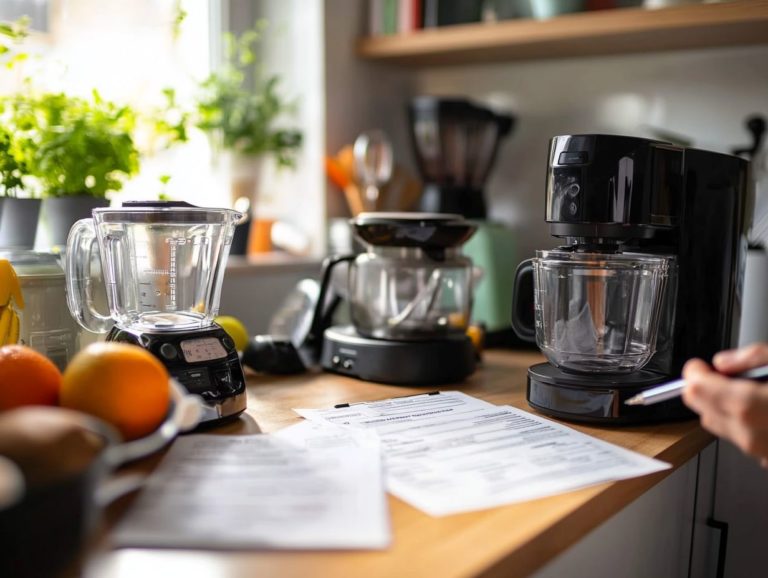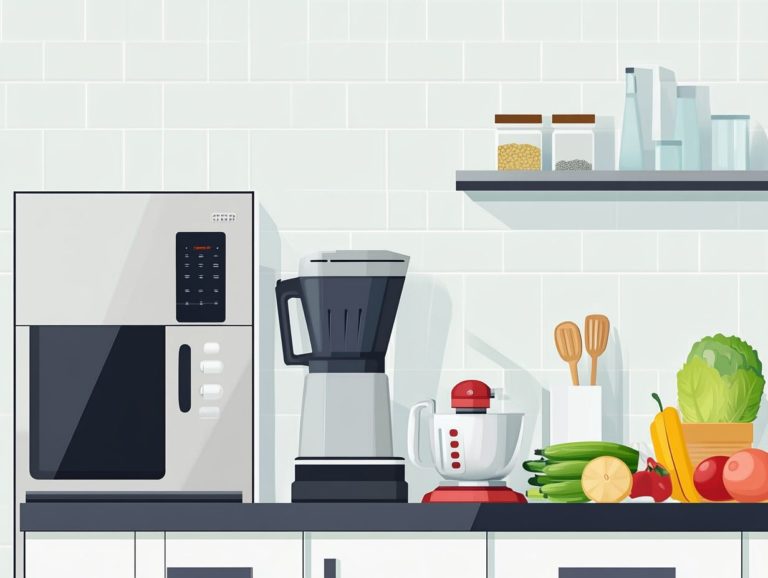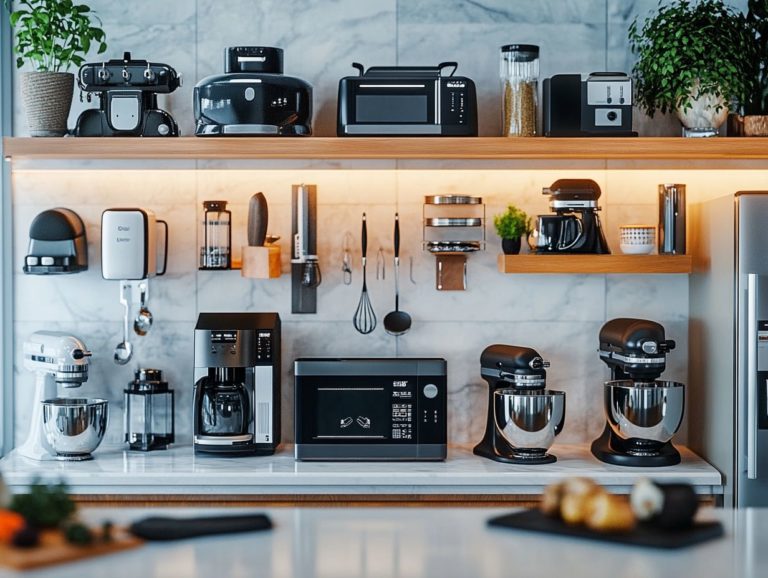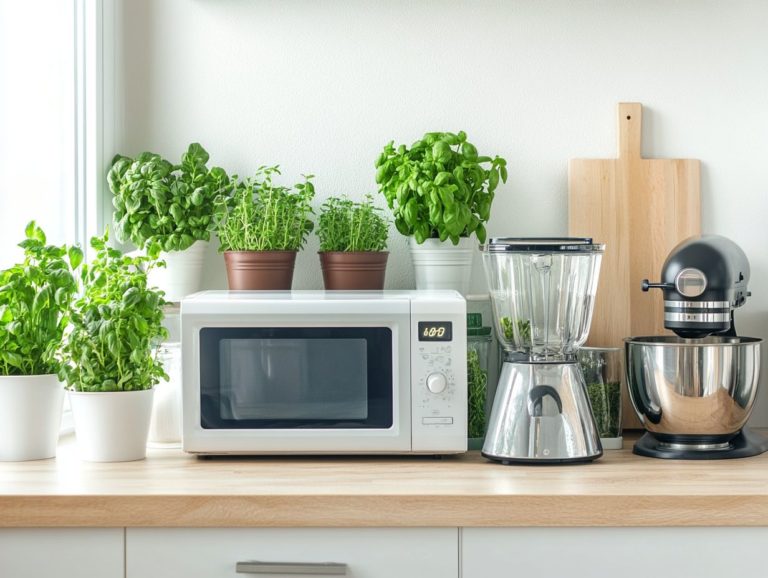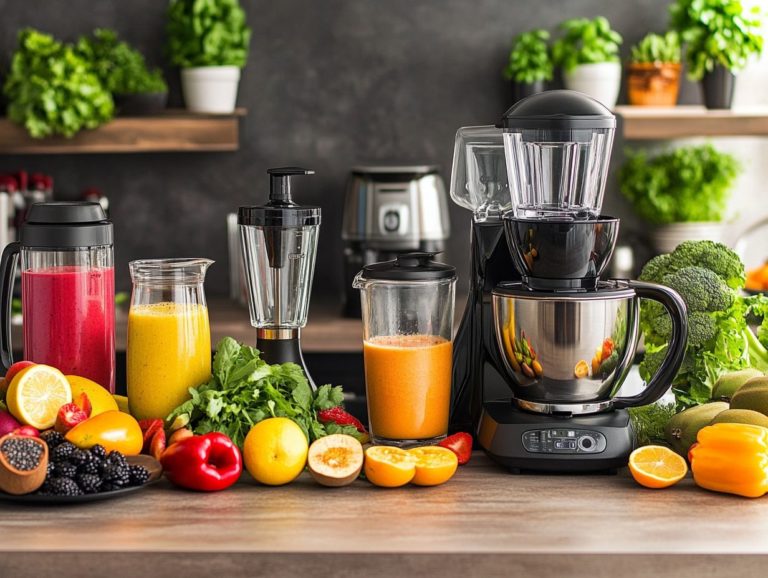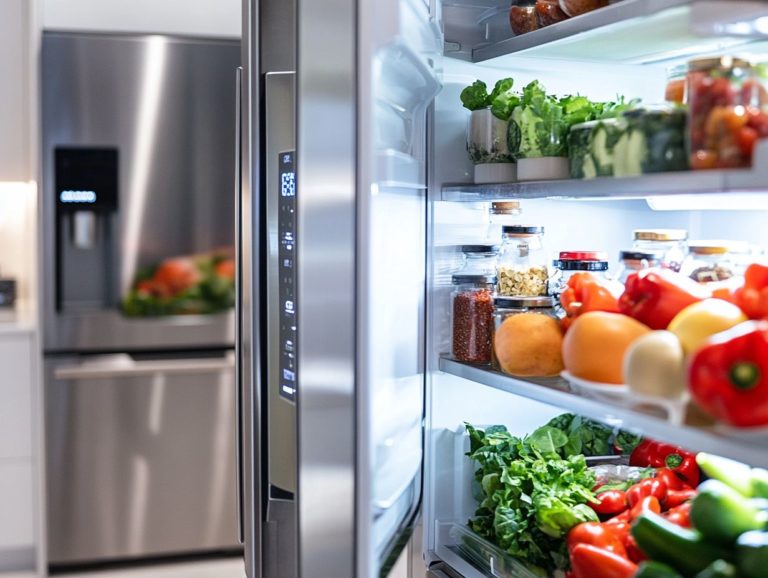How to Maintain Your Kitchen Appliances
Maintaining your kitchen appliances is crucial to ensuring their longevity and optimal performance.
In this article, you’ll discover the importance of regular cleaning and maintenance, along with practical tips to keep your appliances running smoothly. You’ll also learn how to avoid common issues, recognize signs that it’s time to call in a professional, and know when it might be wise to upgrade to newer models.
Continue reading for insights that can save you time, money, and unnecessary hassle!
Contents
Key Takeaways:

Regular cleaning and maintenance are essential for keeping kitchen appliances functioning properly and extending their lifespan. Proper use and storage of appliances can help avoid common problems and the need for costly repairs. If you notice signs of a serious issue or your appliances are outdated, it may be time to call a professional or consider upgrading.
Why is Maintenance Important?
Maintaining your kitchen appliances is crucial for extending their lifespan and ensuring they operate efficiently. Regular upkeep reduces the likelihood of unexpected breakdowns and enhances the overall cleanliness and functionality of key appliances, such as your refrigerator, dishwasher, microwave, oven, stove, washing machine, and dryer.
Using effective cleaning methods with natural solutions like vinegar and baking soda can tackle grease and grime, preserving the quality of your kitchen environment.
Regular Cleaning and Maintenance

Regular cleaning and maintenance of your kitchen appliances are crucial for achieving optimal performance and extending their lifespan. Neglecting this routine can lead to costly repairs and inefficiencies that could easily be avoided.
For instance, routinely cleaning your refrigerator with a vinegar solution not only helps eliminate unpleasant odors but also inhibits bacterial growth. Taking the time to maintain your microwave and dishwasher ensures they function at their best.
By following tailored cleaning tips for each appliance—be it your oven, stove, washing machine, dryer, or coffee maker—you can significantly enhance their efficiency and cleanliness.
Make these practices a priority, and watch your kitchen transform into a smooth-running culinary haven!
Tips for Cleaning and Maintaining Common Appliances
Cleaning and maintaining your essential kitchen appliances—like your refrigerator, microwave, dishwasher, oven, stove, washing machine, dryer, and coffee maker—can be easy with the right tips and tools.
Using natural cleaning agents such as a vinegar solution and baking soda tackles stubborn grease and extends the lifespan of your beloved appliances. By using soft cloths and sponges on delicate surfaces, you can protect your kitchen treasures from scratches and damage. Establishing regular cleaning schedules for each appliance is crucial to prevent buildup and keep everything running smoothly.
For instance, a monthly deep clean for your refrigerator should include:
- Removing old food,
- Wiping down shelves with a mild detergent,
- Checking seals for any signs of wear.
On the other hand, your microwave deserves a quick wipe-down after each use, while a thorough clean every few weeks—complete with a steam clean using lemon water—will help banish any lingering odors.
Don’t forget about the dishwasher; monthly filter cleanings and using a dedicated dishwasher cleaner can prevent clogs and extend its lifespan. As for ovens and stoves, a seasonal scrub with high-temperature commercial cleaners will do wonders.
By following these practices, you’ll enhance the performance of your appliances and foster a cleaner, healthier kitchen environment.
Don’t wait! Start cleaning your appliances today to avoid costly repairs!
Preventative Measures
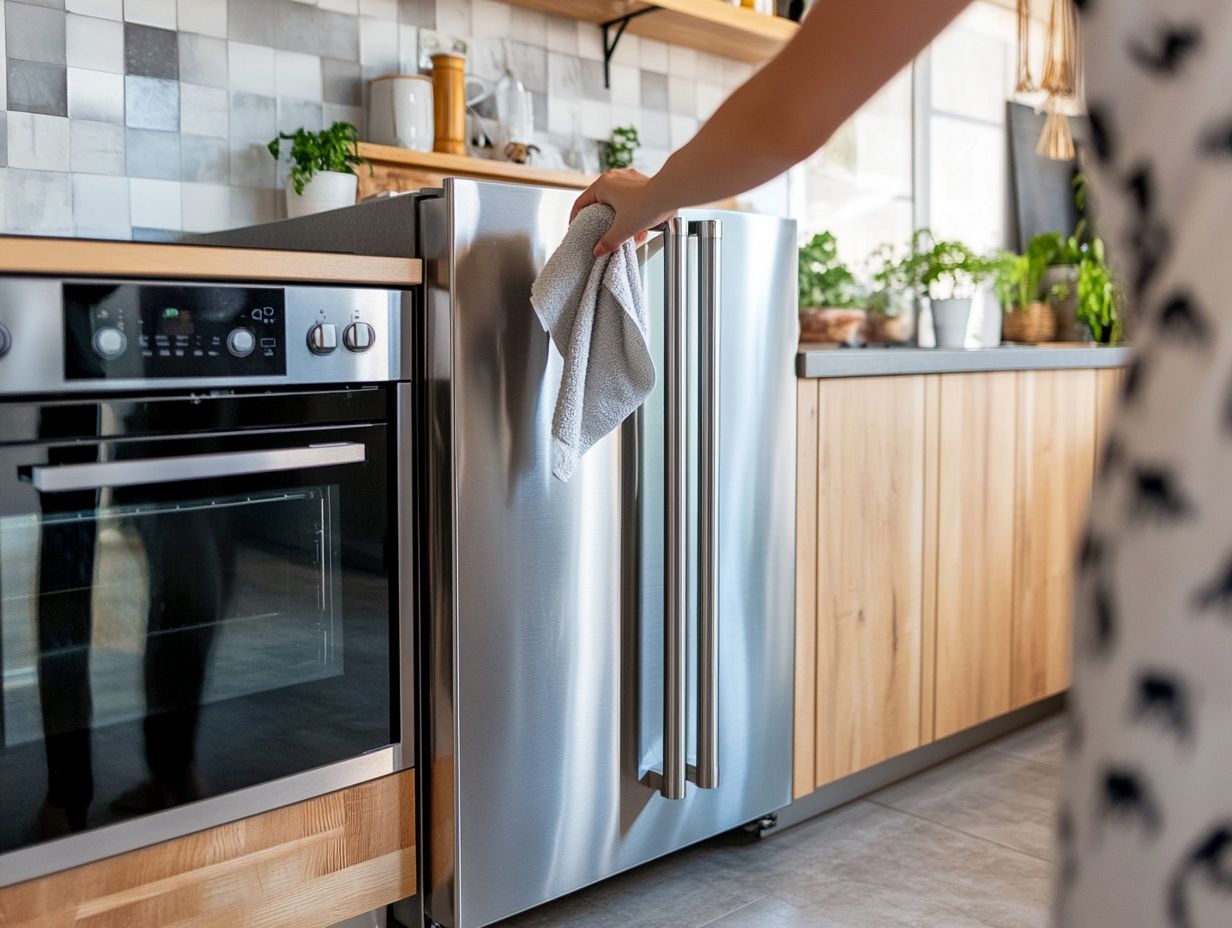
Implementing preventative measures serves as a proactive strategy for maintaining your kitchen appliances. This approach substantially decreases the chances of expensive repairs and unwanted breakdowns.
Regularly cleaning your refrigerator, dishwasher, and microwave upholds hygiene. It also prevents the buildup of grease and grime that can impair performance.
By taking simple yet effective steps—like checking and replacing filters in your oven, stove, washing machine, and dryer—you can significantly enhance their efficiency and longevity.
Additionally, ensure your coffee maker remains free from mineral buildup.
How to Avoid Common Issues
Avoiding common issues with your kitchen appliances is all about striking the right balance between regular maintenance and timely intervention when problems arise.
For instance, keeping your refrigerator at the optimal temperature prevents food spoilage. Routinely cleaning your microwave helps eliminate lingering odors and grease buildup.
Addressing small issues in your dishwasher, oven, or washing machine as they arise can help you avoid larger, more costly repairs down the line.
Create a regular check-up routine by checking for signs of wear and tear, such as unusual noises from the washing machine or inconsistent heating from the oven.
If you notice leaks around the dishwasher door or slow drainage, these could indicate blockages or seal issues that require immediate attention.
Set up simple cleaning schedules like removing lint from the dryer vent or descaling your coffee maker monthly to extend the lifespan of your appliances.
By keeping an eye out for warning signs, such as flashing error codes on your stove or dryer, you can take swift action to prevent more extensive damage.
When to Call a Professional
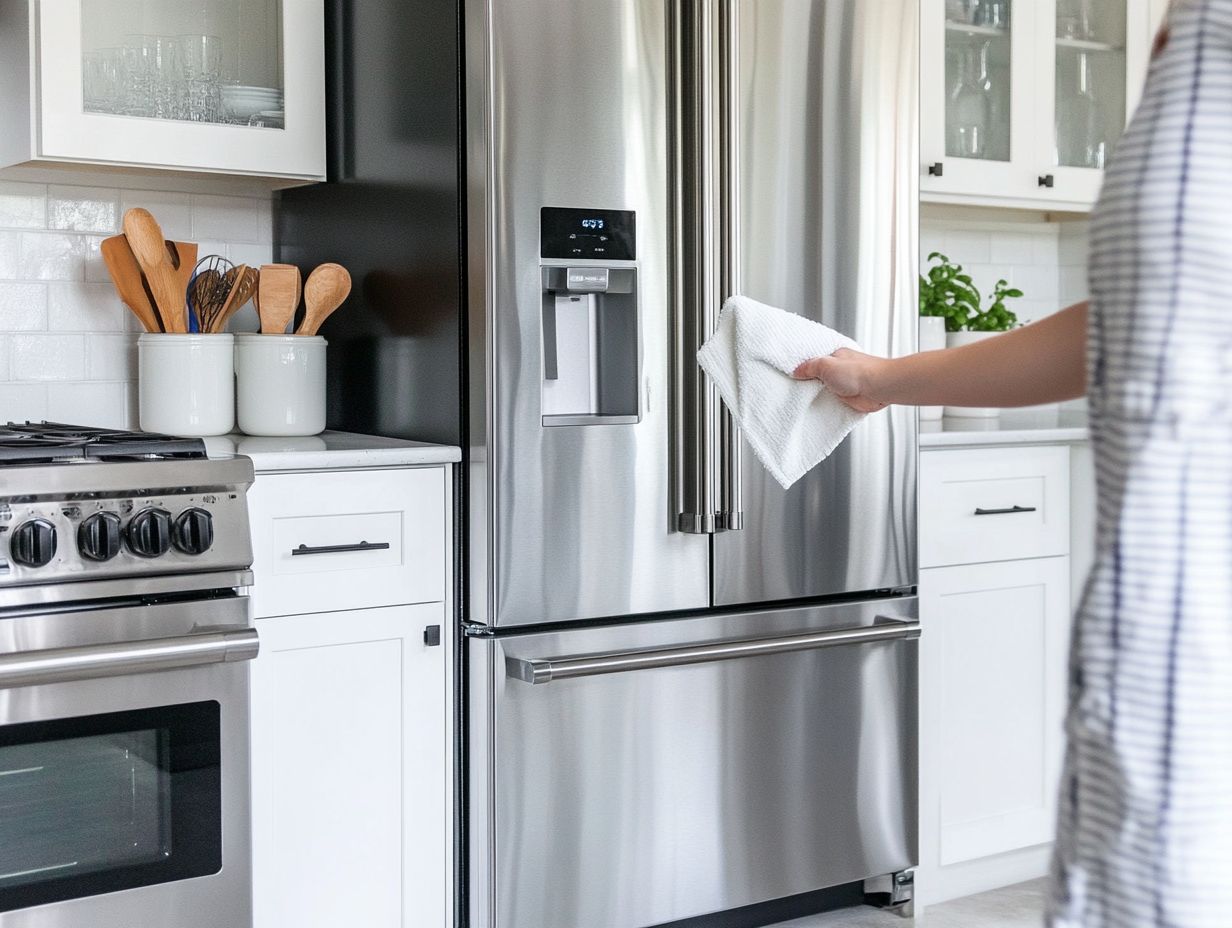
Understanding when to enlist the help of a professional for your kitchen appliances is crucial. This safeguards both their functionality and your peace of mind.
If you find yourself grappling with ongoing issues in your refrigerator, dishwasher, or microwave that standard cleaning tips just can’t fix, it’s time to call in the experts!
Likewise, if your oven, stove, washing machine, dryer, or coffee maker starts to produce strange noises or shows signs of malfunction, reaching out to a professional could save you from potential hazards. It can also prevent costly repairs in the future.
Signs of a Serious Problem
Recognizing the signs of a serious problem with your kitchen appliances is crucial to prevent further damage. It also ensures safe operation.
Common indicators include unusual noises from your refrigerator or dishwasher, persistent leaks from your microwave or oven, and issues with your washing machine or dryer that prevent them from completing their cycles.
If your coffee maker starts acting up or your stove behaves erratically, it’s essential to address these problems promptly with professional maintenance.
Strange odors wafting from your dishwasher or oven can signal electrical issues or food buildup that requires immediate attention.
A sudden spike in your energy bills may mean your appliances are working harder than usual due to malfunctioning components.
Experts advise regular inspections of your appliances to ensure they operate efficiently and safely. Ignoring these warning signs could lead to costly repairs or safety hazards.
Being proactive with maintenance checks can significantly extend the lifespan of your kitchen devices, allowing you to enjoy their benefits for years to come.
Replacing Old Appliances
Replacing old appliances is a significant decision that can profoundly impact your kitchen’s functionality and energy efficiency.
When you contemplate new appliances—be it a refrigerator, dishwasher, microwave, oven, stove, washing machine, dryer, or coffee maker—assess their performance, age, and maintenance history.
Investing in updated models elevates your cooking and cleaning experience. You also enjoy reduced energy costs and enhance the sustainability of your home.
Imagine the joy of cooking with new, efficient appliances!
When to Upgrade and How to Choose New Appliances
Understanding when to upgrade and how to select new appliances is crucial for keeping your kitchen modern and efficient.
Look out for signs that it might be time for a change, such as frequent repairs, soaring energy bills, or outdated features in your refrigerator, dishwasher, microwave, oven, stove, washing machine, dryer, or coffee maker.
A well-timed upgrade can lead to substantial savings on energy costs, elevate your cooking and cleaning experiences, and add convenience to your daily life.
It’s exciting to discover how new models can outperform your old appliances! When evaluating whether to replace an appliance, compare its performance with newer models, particularly those carrying the ENERGY STAR certification, which signifies exceptional energy efficiency.
As you consider potential upgrades, pay attention to technological advancements like smart connectivity, allowing you to control and monitor your appliances remotely.
Multifunctional appliances can save space and enhance your overall experience.
Ultimately, a thoughtful approach to selecting appliances that blend aesthetic appeal with practical utility can transform your kitchen into a more enjoyable and sustainable environment.
Frequently Asked Questions
Maintenance Tips
What are some basic tips for maintaining my kitchen appliances? Some basic tips for maintaining your kitchen appliances include regularly cleaning them, avoiding overloading them, and keeping them away from heat sources.
How often should I clean my kitchen appliances? Clean your appliances weekly to keep them running smoothly and prevent grease buildup.
How do I clean my refrigerator and freezer? To clean your refrigerator and freezer, use a mixture of water and baking soda to scrub away spills or stains. Regularly defrost and remove any expired food items.
What should I do if my stove burners are not working properly? If your stove burners are not working properly, try cleaning them with a mixture of vinegar and water. If the issue persists, it may indicate a bigger problem, and you should contact a professional for assistance.
How can I prevent my dishwasher from developing bad odors? To prevent bad odors in your dishwasher, regularly clean the filter and run an empty cycle with vinegar to remove any buildup. Avoid leaving dirty dishes in the dishwasher for extended periods.
What should I do if my microwave is not heating up food properly? If your microwave is not heating up food properly, check to make sure the door is closing properly and that the power settings are correct. If the issue persists, it may require a professional repair or replacement.
